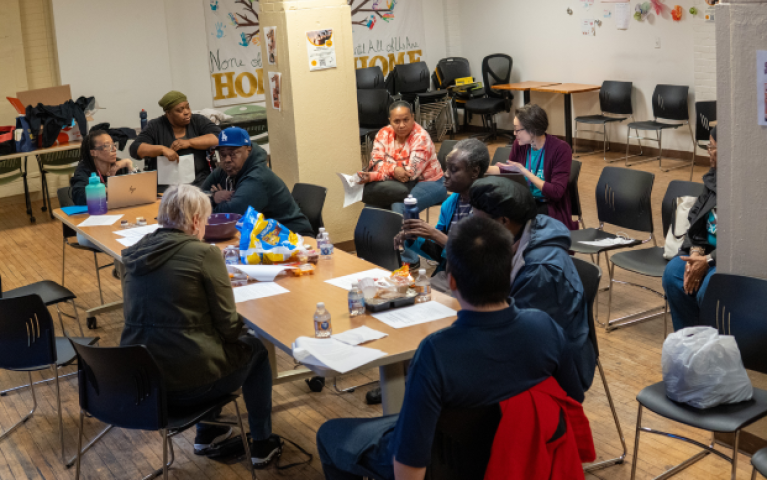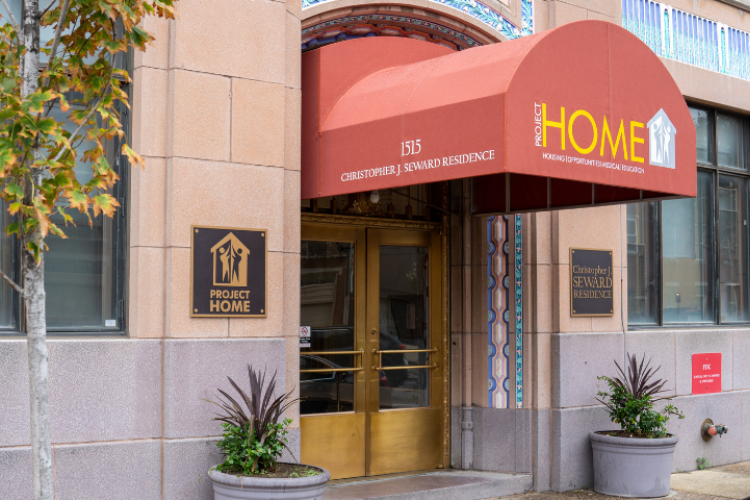A Seat at the Table: How our Resident Advisory Board is Changing Lives

At first glance, the Resident Advisory Board (RAB) at Project HOME might look like any other community meeting—a group of people seated in a room, notes in hand, voices rising or falling in a passionate debate or soft agreement. Look a little closer, however, and you’ll see something far more powerful: a vibrant microcosm of resilience, leadership, and lived experience redefining what it means to build home—not just as a place, but as a purpose.
Stephanie Nixon, a staff member in Mission Nurture, knows this transformation intimately. A longtime participant in RAB, she’s seen it all—from tense discussions about building-wide maintenance concerns to heartfelt moments of breakthrough between residents learning to trust one another. In her eyes, this board is anything but ordinary.
“I used to think my voice didn’t matter,” she says. “But now, when I walk into those meetings, I know I’m part of something bigger. I know I’m making a difference.”
The Resident Advisory Board isn’t just a space to share grievances. It’s a platform for leadership. It’s where voices that have too often been ignored take center stage, shaping the very policies and practices that affect their communities. It’s a movement rooted in the belief that those who’ve lived through homelessness and housing instability bring wisdom that no policy paper or outsider ever could.
What’s more, it's growing—organically, intentionally, and sometimes, beautifully chaotically.
The board meets once a month, convening residents and residential alumni from across Project HOME’s various sites. Some show up in person. Others call in from their apartments. Regardless of how they arrive, what matters most is that they do. “It’s not an elected position,” Stephanie explains. “People come because they care. Because they want to help shape the community they live in. And that makes all the difference.”
Morgen, a 20-year resident of Kate’s Place, reflects on the power of being part of this community. Having been involved in the early formation of the tenants' council and the Resident Advisory Board, Morgen's voice is one that speaks from deep experience.
"I’ve been here for two decades, and when I think about how far we’ve come, I feel so proud of what we’ve built together,” she says. “This place, Kate’s Place, is a wonderful community. I love the people here. There’s always someone to say hello to. Whether it’s a neighbor helping me out of the car, or a child greeting me in the lobby, it’s a place where you feel seen, where you feel loved."
Morgen’s involvement in RAB is more than just attending meetings. She’s played an instrumental role in shaping the policies and practices that help Kate’s Place and other Project HOME sites thrive. She was part of the original team that helped establish the tenants' council in the early days, serving as chair and co-chair at different points in time.
“It’s important to have a seat at the table,” Morgen says with conviction. “In the beginning, Project HOME reached out to me because they knew I was an advocate, and they asked if I would help set up the tenants’ council. We’ve had some wonderful leaders in the past, and we’re working now to bring that back with elections for a new chair and co-chair. It’s a space where residents can truly be heard, and where we can make changes that improve all of our lives.”
One of the key themes that emerges from Morgen’s time with RAB is the sense of shared leadership and collective ownership. "It’s not about just one person leading," she explains. "It’s about everyone contributing, whether it’s sharing ideas in a meeting or helping with decisions that affect all of us. That’s the beauty of RAB—it’s a space for empowerment. It’s not just about voicing concerns; it’s about finding solutions together."
This philosophy is echoed by others in the community. Nassir, another core member of the board, shares that sentiment with warmth and candor. “It’s supporting, uplifting, and empowering,” he says. “We come together to talk about what’s going on in the community, and we get a good feeling from each other. Real community—real healing—starts with showing up.”
Nassir’s presence is more than symbolic. He’s lived the journey—thirty years struggling with homelessness and substance use disorder, and now, nearly five years of recovery. “Before Project HOME, I didn’t know how to live life on life’s terms,” he says. “But the board taught me something different. I learned to communicate. To listen. To be part of a team. And I realized it ain’t all about me. What I’ve been given, I’ve got to give back.”
And give back he does—by mentoring, sharing his story, and inviting others in. He’s the kind of leader who’s unafraid to be vulnerable, because he knows that vulnerability opens the door for others to step through. “You start listening to people, and not just to reply—but to really hear them,” he says. “You don’t tell them what to do. You share something real. You let them know they’re not alone.”
That spirit of empathy and empowerment isn’t accidental—it’s built into the structure and soul of the board. Behind the scenes helping to hold that space is Jeanine “JJ” Johnson, Project HOME’s Resident Leadership Coordinator. Though she’s only been in the role for a few months, JJ already feels deeply rooted in the work. “I love it,” she says with an infectious laugh. “I run the meetings, send out agendas, take minutes, but more than anything, I just help the residents run the show. That’s how it should be.”
JJ sees herself not as a facilitator in the traditional sense, but as a co-builder of space where trust can grow. “The meeting starts with an icebreaker,” she explains, “and not just to be cute. It sets the tone. Then we dive into updates, talk about what’s going on at each site, and share ideas. Sometimes we make welcome baskets. Sometimes we plan events. Sometimes we just listen. And when we listen long enough, we realize we’re not alone in the things we’re facing.”
One of JJ’s favorite developments since stepping into her role is the new RAB-led peer mentorship program that launched this April after a year of careful planning by residents. “They picked the topics, helped shape the curriculum—everything from budgeting to conflict resolution to how to pass a unit inspection,” she says. “We had seven residents sign up as mentors. It was such a proud moment for them.”
And while the program hasn’t yet drawn mentees, JJ isn’t discouraged. “Getting the word out is tough,” she admits. “But we’ll keep at it. Because their work deserves to be seen. Their wisdom deserves to be shared. And when it finally connects? It’ll be magic.”
Magic, it turns out, is something the board specializes in—though not the fairy tale kind. Their magic is the kind born of grit, reflection, and intentional effort. It’s in the way they move meetings from site to site each month to include more voices. It’s in the way they throw bingo nights, potlucks, or dance parties after serious conversations to foster joy and connection. It’s in the way they push each other to lead, even when it’s hard.
Stephanie remembers one board member in particular who didn’t see herself as a leader—at least not at first. “She sat in the back for months, just listening,” Stephanie recalls. “Then one day, she stood up in a meeting and gently, skillfully, de-escalated a situation between two residents. It was so full of love and clarity. I told her, ‘That’s leadership. That’s what this board is about.’”
RAB is not a complaints department, however. It’s not a place where people pass off their problems for someone else to solve. It’s a space where problems are owned collectively, and solutions are crafted from lived wisdom and mutual respect. “It’s not just about having a voice,” JJ explains. “It’s about having a platform and the tools to use it.”
It’s also a place where the stigma of homelessness is dismantled, one honest conversation at a time. “People think homelessness is a moral failure,” JJ says. “But it’s not. It’s life. It’s losing a job. It’s getting sick. It’s a thousand things outside of your control. RAB shows people that recovery, stability, leadership—it’s all possible.”
That’s the most exhilarating element of all: that the people who were once without homes now help guide the policies of an organization dedicated to ending chronic street homelessness. Their voices don’t just matter—they lead.
“If you don’t speak up, people think everything’s fine,” JJ says. “But when you do—when you raise your hand and share what’s real, change starts to happen. That’s what RAB is all about.”
So, what does it mean to have a seat at the table? For Stephanie, Morgen, Nassir, and JJ, it means ownership. It means dignity. It means hope, not as a vague promise, but as a lived experience.
It means that a group of residents, once dismissed or forgotten by the world, now gather every third Monday with clipboards, courage, and a whole lot of heart, to shape the future of their community—together.
Or, as Nassir likes to quote, “None of us are home until all of us are home.”
